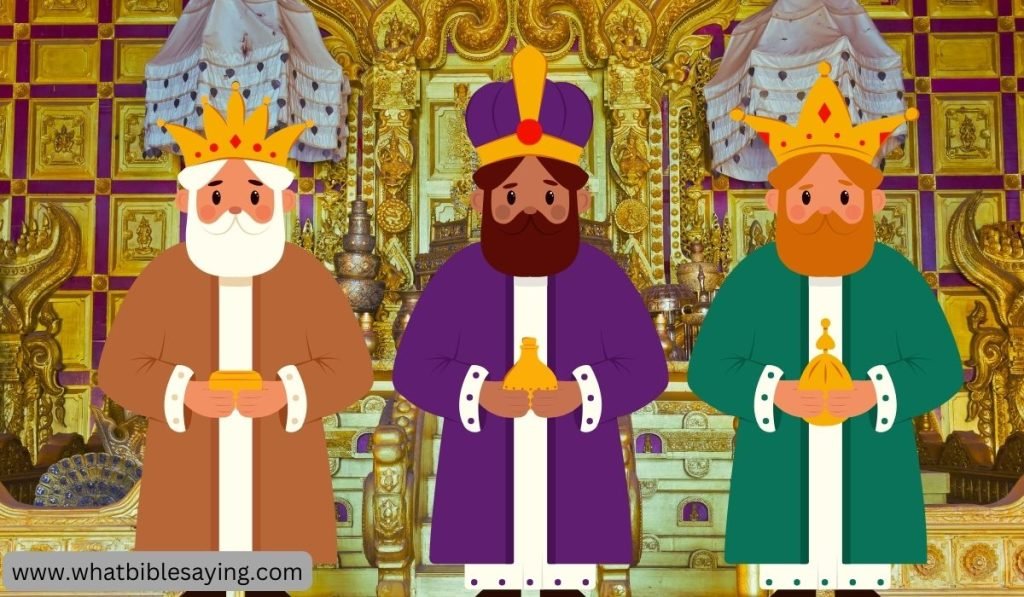When we open the pages of Revelation and read about the “kings of the east,” it feels mysterious almost like a hidden puzzle from ancient times. Who are these kings? Are they symbolic or real? Do they show up elsewhere in the Bible? And what do they have to do with God’s plan for the end of days?
In this article, we’ll dive deeply into Scripture, step by step, using both biblical references and historical insight to understand who the kings of the east truly are. This journey will take us through the Old and New Testaments, prophetic texts, and even into how different Christian traditions view them today.
Let’s begin.
What Does the Bible Say About the Kings of the East?
The exact phrase “kings of the east” appears only once in the entire Bible, in the Book of Revelation:
“The sixth angel poured out his bowl on the great river Euphrates, and its water was dried up to prepare the way for the kings from the East.”
Revelation 16:12 (ESV)
This scene is part of the seven bowls of God’s wrath a series of end-time judgments described in Revelation 16. When the sixth bowl is poured out, the great Euphrates River is dried up, making room for these kings to march westward.
This verse is fascinating for many reasons. The drying up of the Euphrates is not just a physical event it carries deep symbolic and prophetic weight. To understand it, we must go backward in biblical history.
Why the Euphrates River Matters in Prophecy
The Euphrates River was a major boundary in ancient Israel’s world. It formed the eastern edge of the Promised Land (Genesis 15:18) and was considered a protective barrier against foreign invaders, especially from regions like Babylon, Persia, and beyond.
In biblical imagery, when the Euphrates dries up, it signals the removal of a natural defense, allowing powerful eastern forces to invade.
This exact thing happened historically when Cyrus the Great, king of Persia, diverted the Euphrates to invade Babylon in 539 BC. Isaiah even predicted this event centuries earlier (Isaiah 44:27–28). Revelation 16:12 seems to echo that moment but in a far more future, climactic sense.
So now, the big question:
Who Are the Kings from the East?
There are several interpretations let’s look at them clearly.
1. Literal Eastern Kings (Geopolitical View)
Some scholars and theologians interpret the kings of the east as literal national powers from regions east of Israel. These could include:
Nations from Asia such as China, India, or Middle Eastern powers.
A future coalition of eastern superpowers that will cross into the Middle East to wage war at Armageddon (Revelation 16:16).
This interpretation lines up with real-world geography: the Euphrates flows from modern-day Turkey, through Syria and Iraq into the heart of biblical conflict zones. If dried, it would allow easy movement from the East toward Israel.
Many believe this is a preparation for the final battle a massive military invasion that unites eastern powers against Israel and God’s people.
But not all views are geopolitical.
2. Symbolic of Evil Powers (Spiritual View)
Some biblical scholars suggest the kings of the east symbolize spiritual rebellion or demonic forces rallying the world against God.
Why?
Because Revelation is filled with apocalyptic symbols dragons, beasts, and bowls many view the kings not as individual rulers but as representatives of evil systems or godless nations aligned with Satan’s plan.
In fact, the next verses after Revelation 16:12 describe unclean spirits that look like frogs coming from the dragon, beast, and false prophet calling kings to war.
“They are demonic spirits performing signs, who go abroad to the kings of the whole world, to assemble them for battle…”
Revelation 16:14
So, in this view, the kings of the east are part of the worldwide rebellion against God, summoned for the final showdown.
3. God’s Agents of Judgment (Prophetic View)
Here’s something most readers miss.
In the Old Testament, God often used foreign kings to carry out His judgment even if they didn’t know it.
Nebuchadnezzar of Babylon destroyed Jerusalem (Jeremiah 25).
Cyrus the Great set the Israelites free (Isaiah 45:1 God calls him “My anointed”).
Could the kings of the east in Revelation be similar? Tools in God’s hand to fulfill prophecy?
This interpretation adds nuance. Rather than viewing them as either “good” or “evil,” it sees them as servants of divine prophecy, allowed to act so God’s plan moves forward.
Related Biblical Figures: Who Are the “Men of the East”?
The Bible uses the phrase “men of the east” in several places most famously in the Book of Job:
“There lived a man in the land of Uz whose name was Job… He was the greatest of all the men of the east.”
Job 1:1–3
In this case, “men of the east” refers to people living east of Israel possibly in Arabia, Mesopotamia, or Edom. These were wealthy, wise, nomadic figures known for their wisdom (see Job’s friends Eliphaz, Bildad, and Zophar).
But this group is not directly related to the kings of the east in Revelation. Still, they give us a cultural lens. The east often symbolized mystery, wealth, and power in biblical imagination.
Are the Three Wise Men the Kings of the East?
Many ask: Are the kings of the east in Revelation the same as the “Three Kings” who visited Jesus at His birth?
The answer is: No but it’s a good question.
Let’s clarify:
The Magi who visited Jesus came “from the east” (Matthew 2:1).
They followed the star to find the newborn King and brought gold, frankincense, and myrrh.
Tradition later called them “kings,” but the Bible never says that.
Their journey represents worship and recognition of Christ, not war or judgment.
So while both groups come from the East, they serve opposite purposes one came to worship the Messiah; the other to join the battle against Him.
Gog and Magog: Are They Connected?
Another question is whether the kings of the east are related to Gog and Magog, mentioned in:
Ezekiel 38–39 (Old Testament)
Revelation 20:8 (New Testament)
These are powerful, end-time enemies who gather nations for battle. They come from the “far north,” not necessarily the east but the symbolism overlaps:
Massive military threat
Global coalition against God’s people
Final showdown
So while they’re not the same, Gog and Magog may be allies or part of the same broader rebellion as the kings of the east.
How Seventh-day Adventists Interpret the Kings of the East (SDA View)
In Seventh-day Adventist (SDA) theology, Revelation is read with prophetic symbols rooted in historical interpretation.
Some Adventist scholars teach that the kings of the east represent Jesus Christ and heavenly forces coming from the east (like the rising sun) to bring justice and redemption.
They highlight verses like:
“For as lightning that comes from the east is visible even in the west, so will be the coming of the Son of Man.”
Matthew 24:27
In this view, the drying of the Euphrates symbolizes the fall of corrupt religious-political powers, and the kings of the east represent Christ’s final victory over them.
This interpretation differs from the literal military view, but it still takes the text seriously just through a more symbolic lens.
Could These Kings Be Rising Today?
Many wonder whether this prophecy is being fulfilled in our generation.
The Euphrates River is literally drying up today due to dams, drought, and climate changes.
Tensions between global powers continue to rise, especially in the Middle East and Asia.
Calls for a one-world government, digital currency, or global military alliances often draw attention to Revelation’s themes.
Still, we must be cautious. The Bible encourages us to be watchful but not fearful, and to keep our hope anchored in Christ not in speculation.
Why Does It Matter?
Whether symbolic or literal, historical or prophetic, the kings of the east matter because they remind us that:
God is sovereign even over world events and politics.
Evil will gather, but it won’t win.
Christ’s return is promised, powerful, and victorious.
Revelation isn’t just about fear and war. It’s about hope the Lamb wins. Jesus reigns. And every king, nation, and power will bow to Him.
In Closing
The identity of the kings of the east in the Bible is layered with meaning. They could represent powerful eastern nations. They could symbolize evil spirits or rebellious rulers. Or they might be part of God’s mysterious plan to bring final judgment and victory.
One thing is certain: when we read these ancient words, we’re not just looking at an old scroll we’re being invited to watch, prepare, and trust the One who holds the future in His hands.
Let’s stay alert, stay grounded in Scripture, and keep our eyes fixed not on fear but on faith.













